One of the most intriguing truths about God is surely that he is one, and yet three. That God is a Trinity — there is one God who eternally exists as three distinct Persons — Father, Son and Holy Spirit — is one of the most foundational doctrines of the Christian faith. It is crucial for our proper understanding of what God is like and how to relate to him.
Scripture is equally clear in both the Old Testament (Isaiah 45:22-23, Deuteronomy 6:4-5) and New Testament (James 2:19, 1 Corinthians 8:4,6, 1 Timothy 2:5-6) that God is one. And yet the Bible also amply testifies to the divinity of the Son and of the Holy Spirit.

On the surface, these two truths — that God is one in essence and three in Persons — seem contradictory. Yet, this contradiction is not real but only apparent from this side of heaven. As much as we would like to have a perfect knowledge of God, it is truly beyond the human mind. As someone noted about the Trinity, “Try to explain it, and you’ll lose your mind; but try to deny it, and you’ll lose your soul.”
We recognise that even when we seek to worship God in spirit and in truth (John 4:24), and with all sincerity, God can often still seem like a mystery to us. He is both revealed and hidden. He is known and yet not fully comprehended. He is simultaneously the Saviour and the Judge of the world. He who is perfect holiness and hates sins, is also the one who loves depraved sinners so immeasurably that he died for our sins.
Undeniably, God is beyond full human comprehension. Perfect knowledge is itself a paradox for us, for while we remain on the earth, we only know in part (1 Corinthians 13:12). Yes, God is a mystery; but not a mystery to be solved but to embrace. Embracing everything that God is and the apparent paradoxes is what faith calls us to.
“For as the heavens are higher than the earth, So are My ways higher than your ways, And My thoughts than your thoughts”. — Isaiah 55:8-9, NKJV
As the leading evangelical professor of theology, Millard Erickson points out, “We do not hold the doctrine of the Trinity because it is self-evident or logically cogent. We hold it because God has revealed that this is what he is like”.
For believers, more critical than a full comprehension of the Trinity, is our encounter with the triune God and its implications for our Christian lives. Because God is triune, our experiences of God must be with all three Persons of the Trinity.
To encounter the Trinity is to encounter the Father who loves us, the Son who redeems us and the Holy Spirit who empowers us for new life and service.
To encounter the triune God is to encounter him who is totally loving and completely holy. The love of the Trinity is expressed in God’s gift of creation at the beginning and in the still greater gift of new life to fallen humanity through salvation. The holiness of the triune God is not simply purity or perfection that places fallen humanity under judgment but a gracious holiness that seeks our sanctification. The suffering of Christ on our behalf at the Cross and the outpouring of the Holy Spirit is the free act of love of the triune God.
Not only do we encounter the Trinity through his perfect love and absolute holiness expressed at the Cross and Pentecost, we experience the Triune God in the community of his people. The very structure of human existence as community bears the image of the Trinity. Hence, the divine declaration that it is not good for man to be alone (Genesis 2:18).
A human life without community is truncated and impoverished. Not only are we created for community, we are redeemed for community. The church is therefore, an ecclesia, an assembly, a gathering.
In our Christian lives, there must be the sharing of life.
How else would the triune God be abundantly experienced and adequately expressed but through the worship and life of the ecclesia, the community of God’s people? To fully embrace the triune God is therefore not just to gratefully accept the life-giving Godhead, but to graciously live in the life-sharing community of the ecclesia. Our worship, prayer and Christian witness can only be sustained by our encounters with the Trinity in the assembly of redeemed.
May the grace of the Lord Jesus Christ, and the love of God, and the fellowship of the Holy Spirit be with you all.
2 Corinthians 13:14, NIV
References:
- Migliore, Daniel L. Faith Seeking Understanding (Grand Rapids: Eerdmans, 2014).
- Erickson, Millard J. Introducing Christian Doctrine (Grand Rapids: Baker Book, 1997).
- McLeod, Donald. “The Doctrine of Trinity”. The Scottish Bulletin of Evangelical Theology, Vol 3, No 1, Spring 1985.
